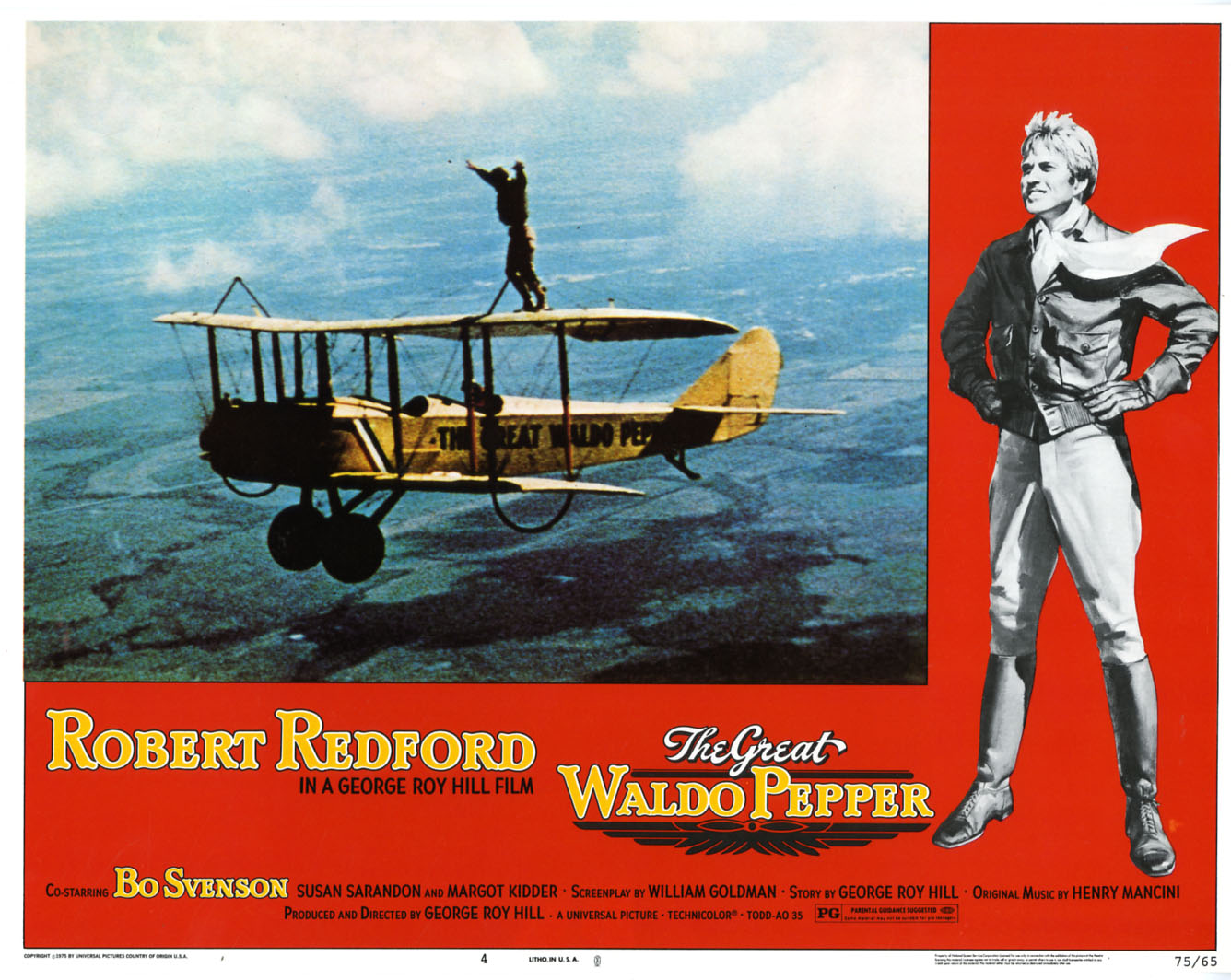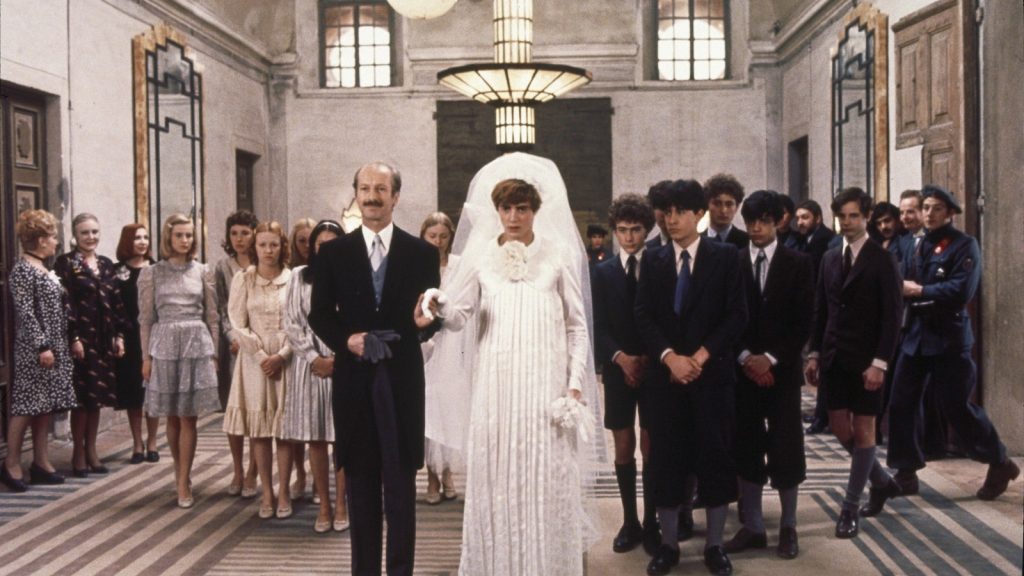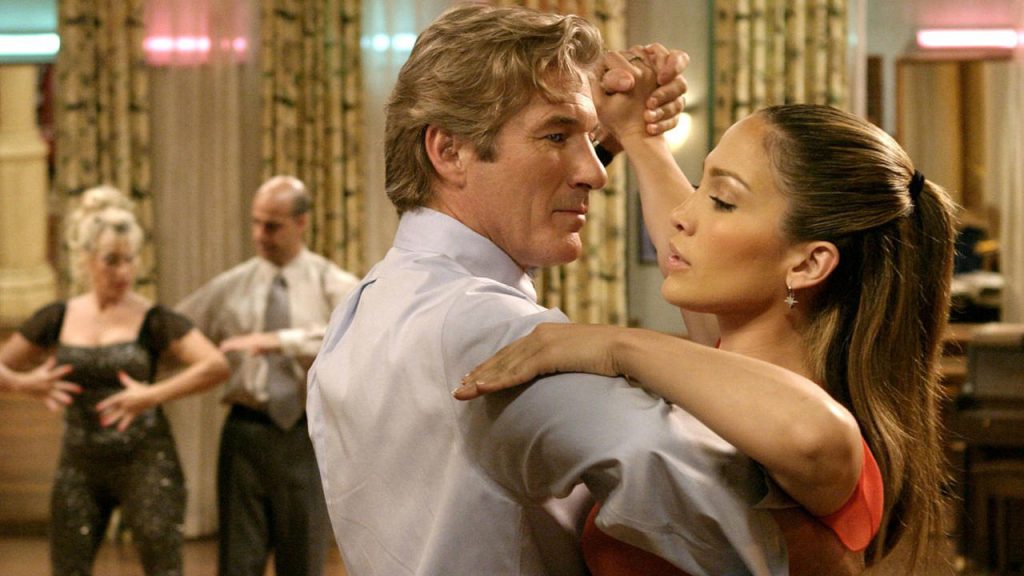It must have been something to be in the audience for The Great Waldo Pepper back in March of 1975. Here was Robert Redford reteaming with director George Roy Hill, following up their blockbuster Best Picture winner The Sting with another handsomely produced tale of old-timey hucksters. They’d even brought back Butch Cassidy and the Sundance Kid screenwriter William Goldman to turn another goofy name nobody had heard before into a big screen legend.
Set in 1926, the film has a familiar, breezy charm for a good little while. Redford plays the title character, a barnstorming biplane pilot who spins tall tales about his WWI record while taking farmers above the clouds for five-minute flights and sweet-talking a wide-eyed movie fanatic (Susan Sarandon) who doesn’t really buy his line of bullshit. But she plays along with it anyway, probably because he looks like Robert Redford. The two team up with Waldo’s persnickety, oddly-accented rival (Bo Svenson) and join a flying circus, coming up with ever more elaborate feats of aerial derring-do to wow the rural, depression era crowds.
And then something horrible happens.
When I was a kid I’d often confused this film with The Pursuit of D.B. Cooper during their constant cable television airings, so I somehow had it in my head that I’d never actually seen The Great Waldo Pepper, which turns out to be half true. Sitting down with the film for the purposes of this piece I was seized by a hazy memory of my mom getting up and shutting off the TV after being appalled by the aforementioned incident. Without getting into specifics, it really is one of the most traumatizing left turns from an era in American cinema that was defined by such shocks. It’s the swiftness of it, I think. Audiences aren’t conditioned to accept such an abrupt non-conclusion to a heroic rescue sequence. Hill doesn’t telegraph it, or even linger on the loss. A beloved character is right there in front of us until they aren’t anymore. It happens that fast, and The Great Waldo Pepper becomes an entirely different movie.
The tonal whiplash is followed by the almost immediate departure of another endearing performer, this one in a much grislier, more protracted fashion. Such ugly realism was important to Hill, a WWII Marine transport pilot and lifelong aviator who flew the camera plane for this film himself. Waldo Pepper was a story of his own devising, the director cashing in all his clout from The Sting’s success to make his most personal project on a massive scale, with amazing aerial photography that wouldn’t be topped until Tony Scott and Tom Cruise felt the need for speed eleven years later with Top Gun. The high-flying acrobatics were engineered by longtime stunt pilot Frank Tallman, a one-legged daredevil who darn near got himself killed on the picture, and joked about it afterwards. Meanwhile, Hill and Goldman fell out so badly over the screenplay they didn’t speak to each other for years.

The movie has that kind of iffy energy. It’s got a weird, bad juju that’s kind of fascinating, especially in the final stretches. The Great Waldo Pepper aims to be gloriously romantic about notions it acknowledges from the outset are entirely idiotic. Redford’s character is furious he missed his chance to get killed in WWI, and he’s going to chase down every opportunity that arises in the ensuing years. (The irony, which I believe isn’t lost on Goldman’s screenplay, is that if Waldo had just hung on a little longer he’d have another Great War in which he could get shot down.)
Instead, Waldo’s dopey dreams of glory are fulfilled in the only place such moronic notions can take flight: Hollywood. Through a bizarre set of circumstances, he finds himself cast in that very same WWI dogfight he’s always lied about, this time faking it with the actual Red Baron himself (well, not really the Red Baron. Snoopy took care of that guy) Ernst Kessler, played by Bo Brudnin in the film’s best performance. The former German war hero is an exhausted alcoholic, drowning in debt and reduced to playing himself in silly American movies full of lies in order to make ends meet. He’s tired of telling the same old stories about shooting down incompetent children in the battles that made him a legend. It’s only when he meets our dear sweet, chivalrous idiot Waldo that he finds a notion for a noble death.
There’s no better actor than Robert Redford when it comes to being full of shit. Here’s a guy who devoted his entire career to finding cracks in his own impossibly handsome facade. He’s always playing characters too good to be true, because they are. Yet as Waldo, I can’t help but feel he’s still a little miscast; I simply can’t buy Redford as reckless and impetuous. He’s too pensive a screen presence, always overthinking everything. (Tom Cruise would make the perfect Waldo Pepper, to a point where I’m surprised he didn’t already try to remake this movie 25 years ago.)
It’s a very strange film, socking you in the gut with the ugly realities of early aviation and then ascending somewhere dreamier, up into the clouds. Opening and closing on tales of storybook heroism, The Great Waldo Pepper is halfway to one of those Redford golden-god hagiographies like The Natural, but the movie is a little too strange and unsettling to actually get there. That’s what’s so interesting about it.
“The Great Waldo Pepper” is streaming on Netflix.



